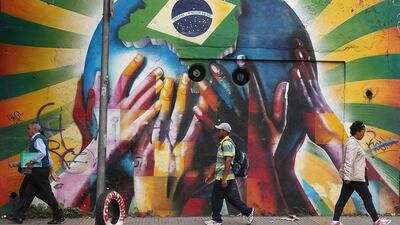South Americans will win
Four years ago, the oft-quoted fact was that no European nation had won the World Cup outside Europe and, of course, Spain and the Netherlands contested the final in Johannesburg.
So expect to hear often that no European nation has triumphed on the South American continent.
Six previous World Cups have been won there by Uruguay (at home and in Brazil), Argentina (at home and in Mexico) and Brazil (in Chile and Mexico). The trend should continue.
For more World Cup stories, visit our dedicated microsite – thenational.ae/worldcup.
Click here for a downloadable 2014 World Cup wallchart.
Brazil won the Confederations Cup on their own soil last year, swatting Spain aside in the final. Argentina topped the South American qualifying group. Uruguay won the last Copa America.
Conditions do play a part, and not just in South America: the four semi-finalists in the 2006 tournament, staged in Germany, were all European.
This view is that, while it is unlikely Uruguay will end their 64-year wait to win the World Cup, the hosts are the likeliest victors, followed by Lionel Messi and his fellow Argentines.
Early exits for Concacaf
It is a moot point which confederation is most over-represented in the World Cup, but this vote goes to Concacaf. Four of its teams – Costa Rica, Honduras, Mexico and the United States – will be in Brazil but, excluding tournaments at home, the Central and North American nations have reached the last eight once since 1930.
Costa Rica and Honduras, probably two of the half-dozen weakest sides at the World Cup, are unlikely to escape their pools. The United States, ranked 13th in the world and in fine form, would have stood a chance in another group but are pitted against Ghana, Portugal and Germany.
Mexico, who were fortunate to qualify after a dreadful campaign, have underachieved and take on Cameroon, Brazil and Croatia. If they, too, fail to go through, there may be a case to transfer a Concacaf place for future tournaments to Africa.
Netherlands will crash out
In many respects, there are three groups of death: D, including Uruguay, England and Italy; G, with Germany, Ghana, Portugal and the USA; and B, where the 2010 finalists Spain and Netherlands meet the rising force Chile.
If the logical expectation is to assume the heavyweights will still find a way to progress, Chile should not be underestimated.
They drew with Spain and Brazil last year and beat Uruguay and England. Assuming Arturo Vidal returns to full fitness, they could be a side in optimum condition, peaking at the right time.
The Netherlands, in contrast, are without the injured Kevin Strootman and Rafael van der Vaart. They have changed tactics, while manager Louis van Gaal has discarded many of his experienced players.
The group may come down to the final day, when the Netherlands face Chile. The pressing game of the South Americans may give the 2010 runners-up a nasty surprise.
Belgium join world powers
It has almost become cliched to talk of Belgium's golden generation, but it remains remarkable that a country that has not qualified for the World Cup since 2002 and has not reached the last eight of any international competition for 28 years has so much talent at the same time.
None of their key players is older than 28; apart from the centre-backs, all are younger than that. Belgium may well be Euro 2016 winners. In the meantime, aided by a favourable draw, they ought to reach the last 16 at the least and have the potential to go further.
Individuals may well return from Brazil established among the world’s best in their position. If goalkeeping has been dominated by the generation of Gianluigi Buffon and Iker Casillas for a decade and more, then Thibaut Courtois, still only 22, may signify that era is ending.
No fairy-tale farewell for all
World Cups can feel like the culmination of a career. In many cases, they are also the conclusion to an international career.
Some veterans have already announced they will not play on. Others have hinted at it. Still more will have the decision taken out of their hands.
In each case, there are reasons to wish them well, to hope their long service and fine talent is reflected in parting contributions.
Yet for some of Buffon, Andrea Pirlo, Miroslav Klose, Diego Forlan, Didier Drogba, Steven Gerrard, Frank Lampard, Samuel Eto’o and Xavi there will be disappointment, perhaps even ignominy.
There may be an indication of waning powers. They may be let down by colleagues. They may simply be reminded of football’s essential cruelty.
sports@thenational.ae
Follow us on Twitter at @SprtNationalUAE


